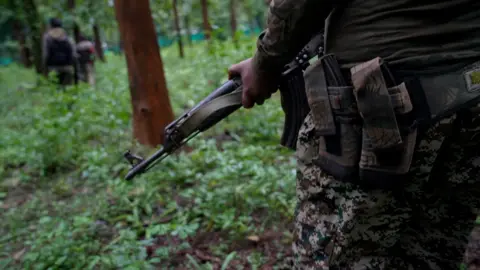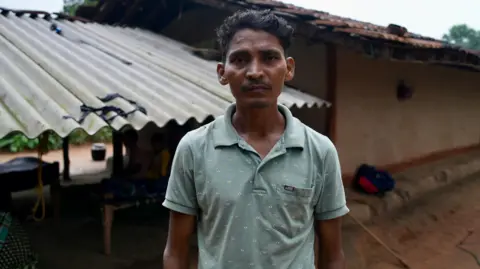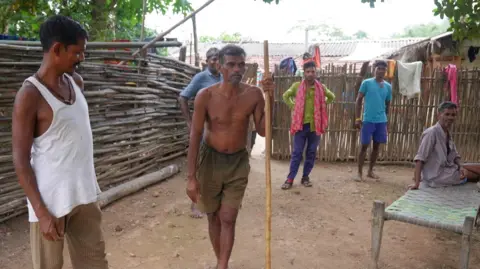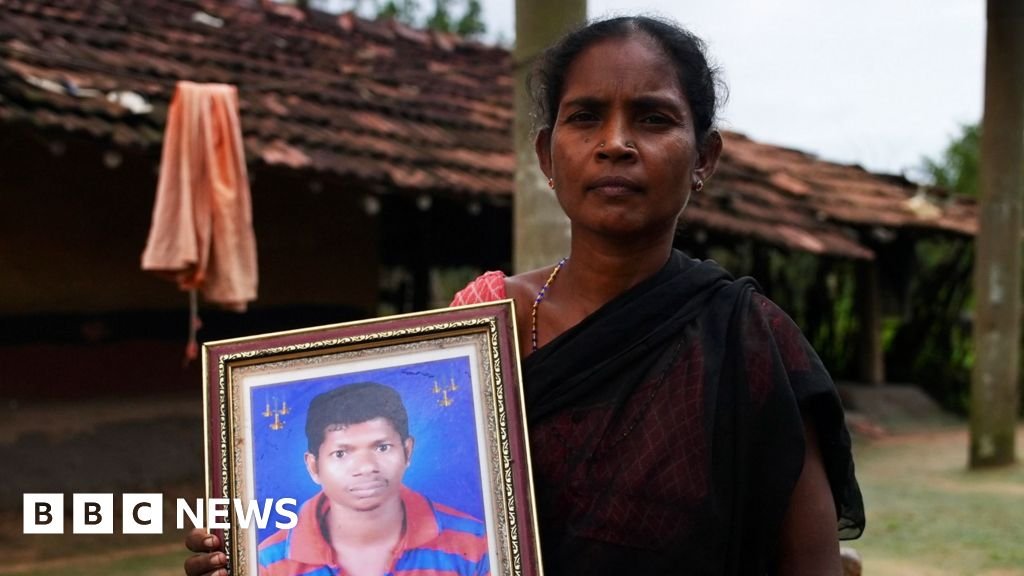




Vishnukant Tiwari, Jugal Purohit and Antariksh JainBBC Hindi
Locals and tribal communities in central and eastern India have long found themselves caught in a crossfire between Maoist rebels and government security forces.
The Maoist insurgency – an armed movement seeking to establish a communist state – has persisted for nearly six decades and claimed thousands of lives.
Left-Wing Extremism (LWE), as it is officially called, began in 1967 as an armed peasant revolt in West Bengal and, by the mid-2000s, had spread to nearly a third of India’s districts. In 2009, Prime Minister Manmohan Singh called it the country’s “greatest internal threat”.
Last year, the Indian government set a March 2026 deadline to end the insurgency and launched intensified security operations under its “ruthless” containment strategy.
Between January 2024 and September this year, security forces killed more than 600 alleged rebels, according to the South Asia Terrorism Portal (SATP). This includes several senior members of the banned Communist Party of India (Maoist).
To tighten control over Maoist-dominated regions, the government also set up dozens of new security camps, particularly in Chhattisgarh, a central Indian state where tribal communities make up around 30% of the population and live deep within its dense forests.
Amid the crackdown, the rebels announced earlier this year that they were open to conditional peace talks with the government.
Officials, however, have ruled out negotiations unless the Maoists lay down their arms. They say that the government’s actions are not just necessary but also seem to be working. According to the federal home ministry’s annual report, security forces carried out nearly twice as many anti-Maoist operations in early 2024 compared with the same period in 2023 and the number of rebels killed was five times higher.
But rights activists worry about the human cost of these operations.
Maoist-affected regions remain among India’s poorest and most underdeveloped, despite rich natural resources, with ordinary citizens – especially tribal communities- bearing the heaviest burden.
In Chhattisgarh’s Bastar district, Pekaram Mettami mourns his son Suresh, in his 20s, killed by Maoist rebels in January over alleged police links – a claim denied by his family, police, and locals.
Suresh, who studied up to 10th grade, was the village’s most educated resident and a strong advocate for local schools and hospitals.
“He only wanted better facilities for his people and that cost him his life,” his father said.
About 100 miles away in Bijapur, Arjun Potam mourns his brother Lachchu, killed in a February anti-insurgency operation. Police said eight Maoists were killed, but Mr Potam insists all were innocent.
“Those who died didn’t have any weapons on them. Some even tried to surrender, but the police did not listen,” he says.
“He [Lachchu] had ties with both police and the Maoists. But he never took up arms,” he added.
Sundarraj P, a senior police official in Bastar, denied the allegations and said that “there has been no case of wrongdoing [against civilians] in recent times”.
But locals allege that such security operations – where the line between armed rebels and ordinary civilians is often blurred – are common.
In 2021, security forces shot dead five protesters in Sukma district opposing a new security camp, locals claim. Police said they were attacked by a mob incited by rebels, but villagers insist the protesters only blocked roads to prevent officials from reaching the site
“They declared my husband a Maoist after he was hit by a bullet,” said Ursa Nande, whose husband Ursa Bheema was among those killed.
An Indian Express report said an inquiry was ordered, but the district’s police chief and top civil official did not respond to BBC Hindi on its outcome.
The Indian government says its “zero-tolerance” policy against Maoism has succeeded, with the District Reserve Guard (DRG) – comprising locals and surrendered Maoists – helping security forces track rebel tactics and hideouts, senior officials told BBC Hindi.
Rights activists oppose including locals in these units, likening them to the now-dissolved Special Police Officers (SPO) force, which also relied on local recruits.
In 2011, the Supreme Court ordered Chhattisgarh to disband the force, calling it unconstitutional and warning that tribal recruits were undertrained and used as “cannon fodder” against rebels.
While this halted tribal recruitment for the SPOs, it didn’t apply to the DRG, which continues to enlist local youth, including former rebels.
Gyanesh, 28, (name changed) is one of them. He surrendered as a rebel last year and joined the DRG within weeks, taking part in counter-insurgency operations despite saying he “has not received any training yet”.
Police deny this, saying all personnel receive proper training before operations, while activists urge the government to prevent ex-rebels from returning to arms.
Author and academic Nandini Sundar, who had petitioned the court against the use of SPOs, says that “a dignified state response” to surrendered rebels would be to say, “come and live a normal life as a civilian”.
The government has also launched incentives to gain local support, including a 10 million rupee ($113,000; £84,000) development fund for villages that secure full Maoist surrenders, along with promises of new schools, roads, and mobile towers in insurgent-affected areas.
But locals remain opposed to these projects, fearing that they will lose their land, be displaced, and see the forests they depend on harmed. Akash Korsa, 26, a tribal resident of Bastar, says these fears help sustain some local support for the Maoists.
Experts doubt the government can fully eliminate Maoism by March. Former Chhattisgarh police chief RK Vij says small rebel groups still exist even in districts officially declared Maoist-free.
For now, caught between the two narratives, locals continue to pay the price for the decades-long struggle.
“We never got any help from the government, even in our darkest moments,” said Ursa Nande. “And now the Maoists too have stopped helping us,”
Follow BBC News India on Instagram, YouTube, X and Facebook.
Source Notice:
This article is republished from
www.bbc.com
on 2025-09-27 01:51:00.
Content and views belong to the original publisher, not UAE Today News.
